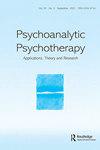Understanding avoidant attachment in a patient with terminal cancer: a psychoanalytic perspective
IF 1.2
Q1 PSYCHOLOGY, PSYCHOANALYSIS
引用次数: 1
Abstract
Describing the course of a short-term supportive-expressive psychotherapy of a male patient with terminal cancer, this study aimed to illustrate the clinical presentation of avoidant attachment behavior and to identify potential challenges in treating these patients from a psychoanalytic perspective. We analyzed eight therapy sessions, recorded and transcribed as part of a randomized controlled trial, following the explication technique of qualitative content analysis. We analyzed a patient with high attachment avoidance as assessed by the Experiences in Close Relationships Scale measuring adult attachment. We found that ‘attachment avoidance’ subsumed different defense mechanisms, which helped the patient to reduce his fear associated with (1) feelings of dependency: denial, (2) overwhelming distress: isolation of affect, displacement, (3) feelings of guilt and shame: repression, (4) regulating his interpersonal relationships: projective identification. Adding psychoanalytic interpretations to the existing material helped to identify rigid defense mechanisms interfering with sharing his fears about death and dying. Still, the low intensity setting offered him a reliable and tolerable therapeutic relationship. Contributing to the understanding of the specific challenges in treating avoidant patients, our findings underline the importance and feasibility of establishing a holding environment and fostering a positive transference relationship to engage in a joint mourning process.从精神分析的角度理解癌症晚期患者的回避型依恋
本研究描述了一名癌症晚期男性患者的短期支持-抑制心理治疗过程,旨在说明逃避型依恋行为的临床表现,并从精神分析的角度确定治疗这些患者的潜在挑战。我们分析了八次治疗,作为随机对照试验的一部分,按照定性内容分析的解释技术进行记录和转录。我们分析了一名通过测量成人依恋的亲密关系体验量表评估的高度依恋回避患者。我们发现,“依恋回避”包含了不同的防御机制,这有助于患者减少与以下方面相关的恐惧:(1)依赖感:否认,(2)压倒性的痛苦:情感的孤立,流离失所,(3)内疚和羞耻感:压抑,(4)调节人际关系:投射认同。在现有材料中添加精神分析解释,有助于确定干扰他分享对死亡和死亡恐惧的刚性防御机制。尽管如此,低强度的环境为他提供了一种可靠且可以忍受的治疗关系。我们的研究结果有助于理解治疗回避型患者的具体挑战,强调了建立一个拥抱环境和培养积极的移情关系以参与共同哀悼过程的重要性和可行性。
本文章由计算机程序翻译,如有差异,请以英文原文为准。
求助全文
约1分钟内获得全文
求助全文
来源期刊

Psychoanalytic Psychotherapy
PSYCHOLOGY, PSYCHOANALYSIS-
CiteScore
1.30
自引率
37.50%
发文量
22
期刊介绍:
Psychoanalytic Psychotherapy publishes original contributions on the application, development and evaluation of psychoanalytic ideas and therapeutic interventions in the public health sector and other related applied settings. The Journal aims to promote theoretical and applied developments that are underpinned by a psychoanalytic understanding of the mind. Its aims are consonant with those of the Association for Psychoanalytic Psychotherapy in the NHS (APP in the NHS) in promoting applied psychoanalytic work and thinking in the health care system, across the whole age range.
 求助内容:
求助内容: 应助结果提醒方式:
应助结果提醒方式:


